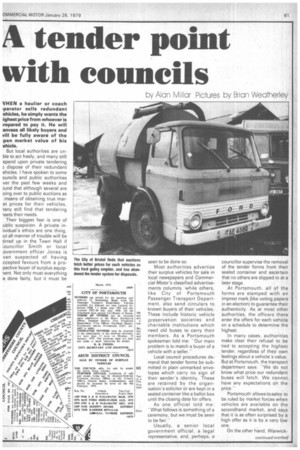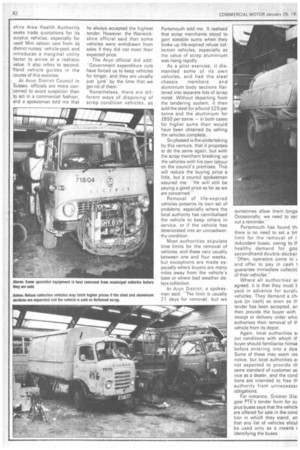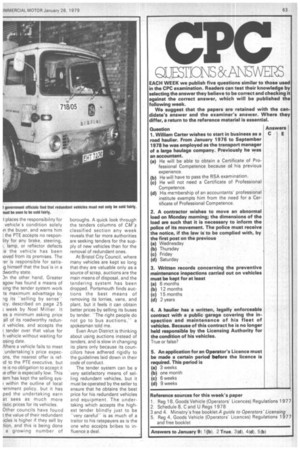A tender point with councils
Page 63

Page 64

Page 65

If you've noticed an error in this article please click here to report it so we can fix it.
by Alan Millar Pic-ures by Brian Weatherley
VHEN a haulier or coach ■ perator sells redundant 'ehicles, he simply wants the iighest price from whoever is irepared to pay it. He will anvass all likely buyers and vill be fully aware of the pen market value of his ehicle.
But local authorities are unble to act freely, and many still epend upon private tendering D dispose of their redundant ehicles. I have spoken to some ouncils and public authorities ver the past few weeks and 3und that although several are oing over to public auctions as means of obtaining true maret prices for their vehicles, iany still find that tendering -ieets their needs.
Their biggest fear is one of lublic suspicion. A private inividual's ethics are one thing, ut all manner of trouble will be tirred up in the Town Hall if :ouncillor Smith or local overnment officer Jones is ven suspected of having ccepted favours from a propective buyer of surplus equiplent. Not only must everything done fairly, but it must be seen to be done so.
Most authorities advertise their surplus vehicles for sale in local newspapers and Commercial Motor's classified advertisements columns, while others, like City of Portsmouth Passenger Transport Department, also send circulars to known buyers of their vehicles. These include historic vehicle preservation societies and charitable institutions which need old buses to carry their members. As a Portsmouth spokesman told me: "Our main problem is to match a buyer of a vehicle with a seller."'
Local council procedures demand that tender forms be submitted in plain unmarked envelopes which carry no sign of their sender's identity. These are retained by the organisation's solicitor or are kept in a sealed container like a ballot box until the closing date for offers.
As one official told me: "What follows is something of a ceremony, but we must be seen to be fair " Usually, a senior local government official, a legal representative, and, perhaps. a councillor supervise the removal of the tender forms from their sealed container and ascertain that no others are slipped in at a later stage, At Portsmouth, all of the forms are stamped with an imprest mark (like voting papers in an election) to guarantee their authenticity. As at most other authorities, the officers there enter the offers for each vehicle on a schedule to determine the highest.
In many cases, authorities make clear their refusal to be tied to accepting the highest tender, regardless of their own feelings about a vehicle's value. But at Portsmouth, the transport department says: "We do not know what price our redundant buses will fetch. We cannot: have any expectations on the price."
Portsmouth allows itssales to be ruled by market forces when vehicles are available on the secondhand market, and says that it is as often surprised by a high offer as it is by a very low one.
On the other hand, Warwick
shire Area Health Authority seeks trade quotations for its surplus vehicles, especially for used Mini saloon cars from its district nurses' vehicle pool, and introduces a marginal utility factor to arrive at a realistic value. It also refers to secondhand vehicle guides in the course of this exercise.
At Arun District Council in Sussex, officials are more concerned to avoid suspicion than to act in a commercial fashion, and a spokesman told me that
he always accepted the highest tender. However, the Warwickshire official said that some vehicles were withdrawn from sales if they did not meet their expected price.
The Arun official did add: "Government expenditure cuts have forced us to keep vehicles for longer, and they are usually just 'junk' by the time that we get rid of them."
Nonetheless, there are different ways of disposing of scrap condition vehicles, as Portsmouth told me. It realised that scrap merchants stood to gain sizeable sums when they broke up life-expired refuse collection vehicles, especially as the value of scrap aluminium was rising rapidly.
As a pilot exercise, it dismantled some of its own vehicles, and had the steel chassis • members an d aluminium body sections flattened into separate lots of scrap metal. Without departing from the tendering system, it then sold the steel for artund £25 per tonne and the aluminium for E.650 per tonne — in both cases far higher sums than would have been obtained by selling the vehicles complete.
So pleased is the undertaking by this venture, that it proposes to do the same again, but with the scrap merchant breaking up the vehicles with his own labour on the council's premises. This will reduce the buying price a little, but a council spokesman assured me: "He will still be paying a good price as far as we are concerned."
Removal of life-expired vehicles presents its own set of problems, especially where the local authority has cannibalised the vehicle to keep others in service, or if the vehicle has deteriorated into an unroadworthy condition.
Most authorities stipulate time limits for the removal of vehicles, and these vary usually between one and four weeks, but exceptions are made especially where buyers are many miles away from the vehicle's base or where bad weather delays collection.
At Arun District, a spokesman said. -The limit is usually 21 days for removel, but we
sometimes allow them longe Occasionally, we need to ser out a reminder."
Portsmouth has found th; there is no need to set a tin' limit for the removal of i• redundant buses, owing to if healthy demand for goo secondhand double-decker -Often, operators come to I. and offer to pay in cash 1 guarantee immediate collectic of their vehicles.
Where all authorities at agreed, it is that they must paid in advance for surph. vehicles, They demand a chi que (or cash) as soon as th tender has been accepted, an then provide the buyer with receipt or delivery order whic 'authorises their removal of th vehicle from its depot.
Again, local authorities si out conditions with which th buyer should familiarise himse before entering into a dea Some of these may seem res rictive, but local authorities at not expected to provide th same standard of customer se vice as a dealer, and the cond rions are intended to free th authority from unnecessar obligations'.
For instance, Greater Glai gow PTE's tender form for su plus buses says that the vehicic are offered for sale in the cond lion in which they stand, an that any list of vehicles shoul be used only as a means identifying the buses.
t places the responsibility for vehicle's condition solely in the buyer,. and warns him t the PTE accepts no responlity for any brake, steering, lamp, or reflector defects ;e the vehicle has been loved from its premises. The fer is responsible for satisig himself that the bus is in a dworthy state.
Dr) the other hand, Greater sgow has found a means of king the tender system work Is maximum advantage by rig its "selling by sense" icy, described on page 25 ; week by Noel Mi'her. It :es a minimum asking price all of its roadworthy redunit vehicles, and accepts the t tender over that value for h vehicle without waiting for osing date, Nhere a vehicle fails to meet undertaking's price expecons, the nearest offer is refKI to the PTE executive, but re is no obligation to accept it le offer is especially low. This tern has kept the selling syswithin the outline of local fernment policy, but it has ped the undertaking earn at sees as much more listic prices for its vehicles. Other councils have found t the value of their redundant ides is higher if they sell by lion, and this is being done a growing number of boroughs. A quick look through the tenders columns of CM's classified section any week reveals that far more authorities are seeking tenders for the supply of new vehicles than for the removal of redundant ones.
At Bristol City Council, where many vehicles are kept so long that they are valuable only asla source of scrap, auctions are the main means of disposal, and the tendering system has been dropped. Portsmouth finds auctions the best means of removing its lorries, vans, and plant, but it feels it can obtain better prices by selling its buses by tender_ -The right people do not go to bus auctions," a spokesman told me.
Even Arun District is thinking about using auctions instead of tenders, and is slow in changing its plans only because its councillors have adhered rigidly to the guidelines laid down in their code of conduct.
The tender system can be a very satisfactory means of selling redundant vehicles, but it must be operated by the seller to ensure that he obtains the best price for his redundant vehicles and equipment. The undertaking which accepts the highest tender blindly just to be "very carefulis as much of a traitor to his ratepayers as is the one who accepts bribes to influence a deal.












































































































